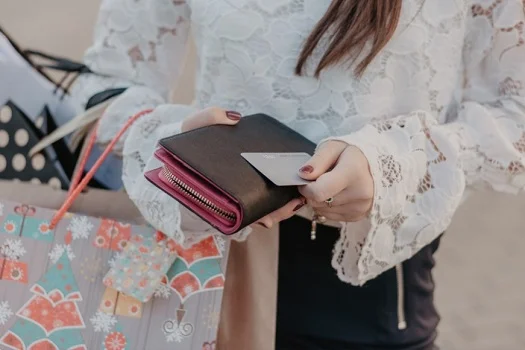Retail Therapy and Credit Card Debt

rebuild your worth, book a free consultation todayBook Now
By Rosemarie Gauthier | Reading time:4 minutes, 31 seconds. Contains 905 words
Shopping. It’s a part of life. Some people love it and others would rather chew on shards of glass.
Retail therapy is commonly used to describe indulging oneself in shopping bliss.
If you’re like me, then pre-pandemic you probably went to the mall on the weekend, met with a friend, browsed a popular bookstore with coffee in hand and marvelled at all their unique knick-knacks. I’m one of the people who loved it.
And that was just the beginning.
We would spend the next few hours shopping for the things we needed and lots of things we didn’t. It was more of a social activity than a chore that I had to get done. This was especially satisfying if I was feeling stressed or down because it completely changed my mood. Even window shopping (just looking at items but not buying them) could be therapeutic!
That feeling of ‘happy’ is what retail therapy is all about.
These days, considering that the malls are open one day and then closed for weeks at a time, I get my retail therapy from shopping online. I’m no stranger to buying things on the internet but since the pandemic… well, let’s just say I’ve never had so many cardboard boxes in my apartment. My cats are ecstatic.
Well, as it turns out, it’s all in my head. Literally.
In a 2014 study, researchers found that retail therapy works wonders for turning those frowns upside down!
So, then it’s not a bad thing?
If it makes you feel better and doesn’t hurt anyone, including yourself, then how is it a bad thing? It’s not, necessarily. It only becomes a problem if you tend to overindulge in your ‘therapy’. Admittingly, being able to shop on the internet, 24/7 for just about anything your heart could desire and having it delivered to your door has the potential for making the journey from retail therapy to overspending a very short trip.
If you spend within your limit or have plenty of disposable income, you are likely to avoid any negative side effects. Spoiling yourself occasionally is not a bad thing. Moderation is key, as it is with most things that are indulgent.
That being said, if you’re spending more money than you are bringing in and are relying on credit cards to make those purchases, you may end up stuck in the ‘financial Groundhog Day of debt’.
Tips to keep your spending habits in check
There is no shame in using retail therapy from time to time to lift your spirits. Keeping these tips in mind will help to keep your shopping behaviours in check and allow you to avoid feeling guilty when you make those occasional ‘feel good’ purchases.

1. Make a budget and stick to it.
Overspending and creating debt for yourself are the potential negative impacts of retail shopping therapy. But if you create a budget every month that includes setting aside an amount for self-indulgence, it’ll make it easier to keep a leash on your spending habits.
In this instant gratification culture, we live in, having the patience to save up for something that may take weeks or months is difficult but it’s the best way to be able to make that special purchase without paying interest or incurring any debt. It can also feel very rewarding to know you have the self-restraint to save enough money to buy what you want.
2. Sleep on it first.
I remember hearing somewhere years ago that if you’re eager to buy something a little more expensive or treat-worthy, to sleep on it for 2–3 days. If after that time you still feel the same way, then buy it (providing you have the funds to do so). This ensures that you are certain that you do want the item and it’s not just an impulse buy.
Sometimes just browsing for an item you want online, whether that be a hot-pot, or a framed print or the newest iPhone might be just the thing you needed.
3. Know when it’s time to get help
As we’ve discussed, using retail therapy occasionally to feel better is not something to be concerned about most of the time.
However, if you’re already in a substantial amount of debt and you’re using retail therapy to feel better about yourself, spending more is only going to make you feel worse in the long run. The cycle of buying, feeling better, getting the credit card bill, then feeling guilty and shameful is a vicious one.
If you’re finding that your monthly payments are more than you can afford, or if you’ve needed an instant payday loan on more than one occasion, or if the amount owing on your credit cards is increasing instead of decreasing, it might be time to consider getting a professional to help you with your debt issues. Bromwich+Smith are those professionals. Now you can take action to get that debt behind you. Get that overwhelming and crushing debt off your back so you can thrive again.
No matter how difficult or complicated your financial situation may seem, there are options available to help you rebuild and thrive. Our Debt Relief Specialists are available by phone at 1.855.884.9243, or you can request a call back via our contact us page. There is no need to travel to a local office. Licensed Insolvency Trustee, Bromwich+Smith, is now offering video appointments, with all services available from the comfort of your home.
In conclusion
Retail therapy isn’t a problem until it becomes one. If you’re not using it consistently as a coping mechanism or digging yourself a deep trench in financial difficulties as a result, then carry on. It really can help you feel better! I know it works for me.
Author:
|
Rosemarie Gauthier
|